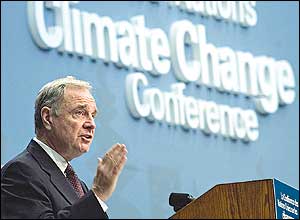December 9 , 2005
Martin remarks miff White House
America's image being sullied amid Canadian electioneering, says U.S. ambassador
Canadian Press
WASHINGTON — The U.S. administration has told Canadian Ambassador Frank McKenna it strongly disagrees with Prime Minister Paul Martin’s recent negative remarks regarding American policy on climate change, U.S. officials said Friday.

Prime Minister Paul Martin, seen addressing the UN Climate Conference in Montreal on Wednesday, apparently said something that upset the American government. A Bush administration official summoned Canada's ambassador, Frank McKenna, to register displeasure. (CP File Photo)
The disapproval was voiced at a meeting Thursday between McKenna and Jim Connaughton, the White House’s environmental guru, the officials said.
But both Connaughton ’s office and the Canadian Embassy denied reports that McKenna was summoned to the White House for a tongue-lashing over the Martin comments.
Absolutely not, said Michele St. Martin, spokeswoman for the Council on Environmental Quality headed by Connaughton, calling it a routine get-together between two men who have a strong relationship.
“That ambassador asked to see Jim to discuss a number of issues including the climate change meeting in Montreal and other matters they’re working on in typical fashion," said St. Martin.
“The door was open. There was no anger. There was no screaming. There was no drama of any kind,” she said. St. Martin declined to go into the specifics of what they talked about.
McKenna was travelling in the United States and declined comment, but the Canadian Embassy backed up St. Martin’s account.
“We asked for the meeting to talk about the (greenhouse gas) proposals and how the U.S. was responding,” said embassy spokesman Bernard Etzinger.
“They had a cordial conversation. They talk a lot.”
U.S. officials speaking on condition of anonymity, however, said Connaughton was conveying the White House’s displeasure at what they considered cheap electioneering by Martin in the campaign for the Jan. 23 vote in Canada.
“My understanding is that (he) made very clear his unhappiness over Mr. Martin’s comments, particularly singling out the United States,” said a State Department official.
On Wednesday, Martin accused the Americans of being deaf to global opinion on the need to sign the Kyoto Protocol limiting harmful emissions that contribute to global warming.
“We strongly disagree with some parts of the speech,” a White House spokesman said. “I wouldn’t call it anger.”
One American official at the Montreal conference said Martin’s words killed any hope of bringing Washington into discussions about deeper reductions after 2012 when the Kyoto accord runs out.
Also Friday, U.S. Ambassador David Wilkins said overheated election rhetoric is prompting some Canadian officials to burnish Canada’s image by sullying the reputation of the United States.
Wilkins expressed regret that the United States was being drawn into a campaign that it was trying to stay out of.
“It appears that oftentimes, some officials, in order to build Canada up, attempt to tear the United States down,” Wilkins told CP Friday.
“I’m sure the election plays a role in that or is to some extent a cause of that.”
Wilkins was in the audience at the UN Conference on Climate Change when Martin made his remarks on the Kyoto agreement.
Martin was unrepentant Friday.
“The foreign policy of this country — the overall policy of this country — is set by the prime minister,” he said in Montreal. “And I’ll continue to do that.”
The U.S. ambassador said he was taken aback by Martin’s position and the vehemence with which it was argued.
“In view of the fact that the United States’ performance on climate control over the last few years has been better than Canada’s, I was surprised by those comments,” Wilkins said.
The United States has not signed the Kyoto Protocol, which called on countries to cut greenhouse-gas emissions. Since the agreement was signed in 1990, U.S. emissions have increased by 13 per cent. Canada, which did sign Kyoto, has seen its emissions jump by 24 per cent.
“This administration has spent more money on technology and research on climate control than any other country in the world,” Wilkins said.
The United States has spent $20 billion on climate science over the past five years and will spend another $5.5 billion next year, he said.
“Actions speak louder than words, and we’ve taken strong actions.”